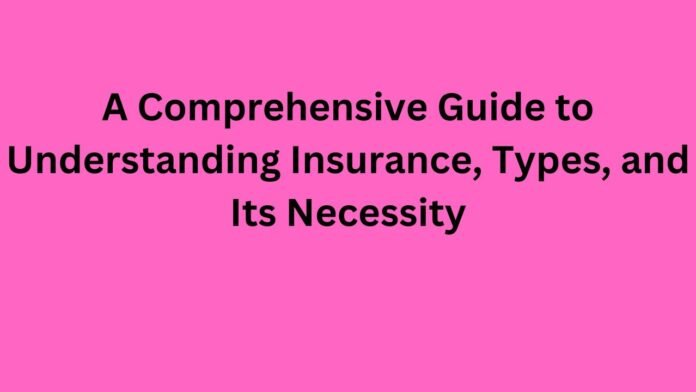Insurance is a financial tool designed to mitigate the risks associated with unexpected events and losses. By transferring the burden of potential loss to an insurance company in exchange for a premium, individuals and businesses can protect themselves against financial hardship and uncertainty. In this article, we’ll explore the concept of insurance, the various types available, and why it’s essential to have insurance coverage in today’s unpredictable world.
Understanding Insurance:
At its core, insurance is a contract between an individual or entity (the insured) and an insurance company (the insurer). The insured pays a premium to the insurer in exchange for a promise of financial protection against specific risks or losses. In the event of a covered loss, the insurer compensates the insured according to the terms of the insurance policy.
Types of Insurance:
Insurance comes in many forms, each tailored to address different types of risks and provide protection in various areas of life. Some of the most common types of insurance include:
Health Insurance:
Health insurance covers medical expenses incurred by the insured, including doctor visits, hospitalization, prescription medications, and preventive care. Health insurance can be obtained through employers, government programs (such as Medicare and Medicaid), or purchased individually from private insurers.
Life Insurance:
Life insurance provides financial protection to beneficiaries in the event of the insured’s death. There are several types of life insurance, including term life insurance, whole life insurance, and universal life insurance, each offering different features and benefits.
Auto Insurance:
Auto insurance offers coverage for damages or injuries resulting from car accidents, theft, vandalism, or other incidents involving vehicles. Auto insurance typically includes liability coverage, collision coverage, comprehensive coverage, and uninsured/underinsured motorist coverage.
Homeowners Insurance:
Homeowners insurance protects against damage to the insured’s home and belongings caused by perils such as fire, theft, vandalism, or natural disasters. Homeowners insurance also includes liability coverage for injuries or property damage occurring on the insured’s property.
Renters Insurance:
Renters insurance provides coverage for tenants renting a home or apartment, protecting their personal belongings against theft, fire, or other covered perils. Renters insurance also includes liability coverage for accidents or injuries occurring in the rented property.
Disability Insurance:
Disability insurance provides income replacement benefits to the insured in the event of a disabling injury or illness that prevents them from working and earning a living. Disability insurance can be short-term or long-term and may be obtained through employers or purchased individually.
Business Insurance:
Business insurance offers protection for businesses against various risks and liabilities, including property damage, liability claims, worker injuries, and business interruption. Business insurance can be customized to meet the specific needs of different industries and business types.
Travel Insurance:
Travel insurance provides coverage for unforeseen events that may disrupt or impact travel plans, such as trip cancellation, trip interruption, lost luggage, medical emergencies, or travel delays. Travel insurance offers peace of mind and financial protection for travelers.
Pet Insurance:
Pet insurance covers veterinary expenses for medical treatments, surgeries, and medications for pets in the event of illness or injury. Pet insurance can help pet owners manage the cost of veterinary care and ensure their furry companions receive the medical attention they need.
Umbrella Insurance:
Umbrella insurance offers additional liability coverage beyond the limits of standard insurance policies, providing an extra layer of protection against catastrophic events or large liability claims. Umbrella insurance is designed to protect assets and provide financial security in case of lawsuits or legal judgments.
Necessity for Insurance:
Insurance is essential for several reasons, including:
- Financial Protection:
Insurance provides financial protection against unexpected events and losses that could otherwise result in significant financial hardship or bankruptcy. By transferring the risk to an insurance company, individuals and businesses can avoid bearing the full burden of potential losses themselves. - Risk Management:
Insurance helps individuals and businesses manage risks by spreading the financial impact of potential losses across a larger pool of policyholders. By paying premiums into a common fund, policyholders collectively share the costs of covered losses, reducing the financial impact on any single individual or entity. - Legal Compliance:
Certain types of insurance, such as auto insurance and workers’ compensation insurance, may be required by law to comply with legal regulations and financial responsibility requirements. Maintaining adequate insurance coverage ensures compliance with legal mandates and protects against potential penalties or fines. - Peace of Mind:
Insurance provides peace of mind by offering a safety net and financial security against unforeseen events and uncertainties. Knowing that you have insurance coverage in place can alleviate worries and anxieties about potential risks and allow you to focus on living your life and pursuing your goals. - Asset Protection:
Insurance protects assets and helps safeguard wealth against the financial consequences of liability claims, lawsuits, property damage, or other adverse events. By having insurance coverage in place, individuals and businesses can protect their assets and preserve their financial stability for the future.
Conclusion:
Insurance plays a vital role in modern society by providing financial protection, risk management, legal compliance, peace of mind, and asset protection against unexpected events and losses. With a wide range of insurance options available to address different types of risks and needs, individuals and businesses can tailor their insurance coverage to suit their specific circumstances and objectives.
By understanding the concept of insurance, exploring the various types of insurance available, and recognizing the necessity for insurance in today’s unpredictable world, individuals can make informed decisions to protect themselves, their families, and their assets for the future.









![What is Kmspico and how to use it ?[Safe download links] What iskmspico and how to use it](https://latestechnews.com/wp-content/uploads/2019/09/images.jpg)




![How to Clear Cache in Kodi [2023] (Guide) clear cache in kodi](https://latestechnews.com/wp-content/uploads/2019/11/cache-title.jpg)






![5 Best Xbox Emulators For PC 2019 [Download Link Included] Xbox Emulators](https://latestechnews.com/wp-content/uploads/2019/08/Xbox-Emulators.jpg)

